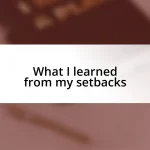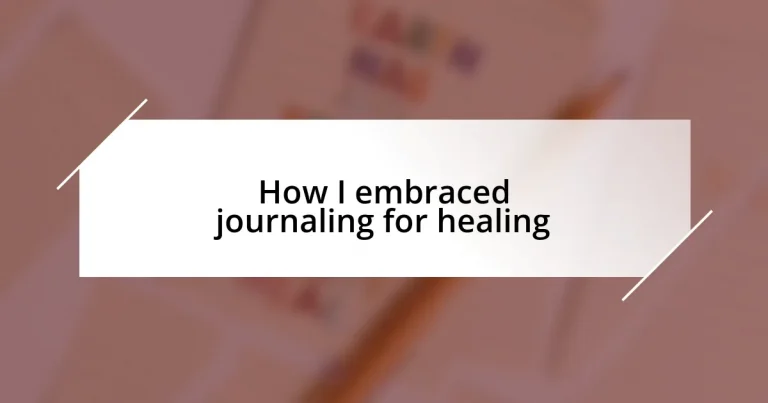Key takeaways:
- Journaling serves as an emotional sanctuary, providing clarity and a cathartic release from overwhelming thoughts.
- Establishing a consistent journaling routine, such as dedicating time daily, enhances the practice and mental well-being.
- Experimenting with various journaling methods (free writing, gratitude journaling, bullet journaling) can significantly impact one’s healing journey.
- Using specific prompts can facilitate deeper self-reflection, leading to personal growth and emotional insight.
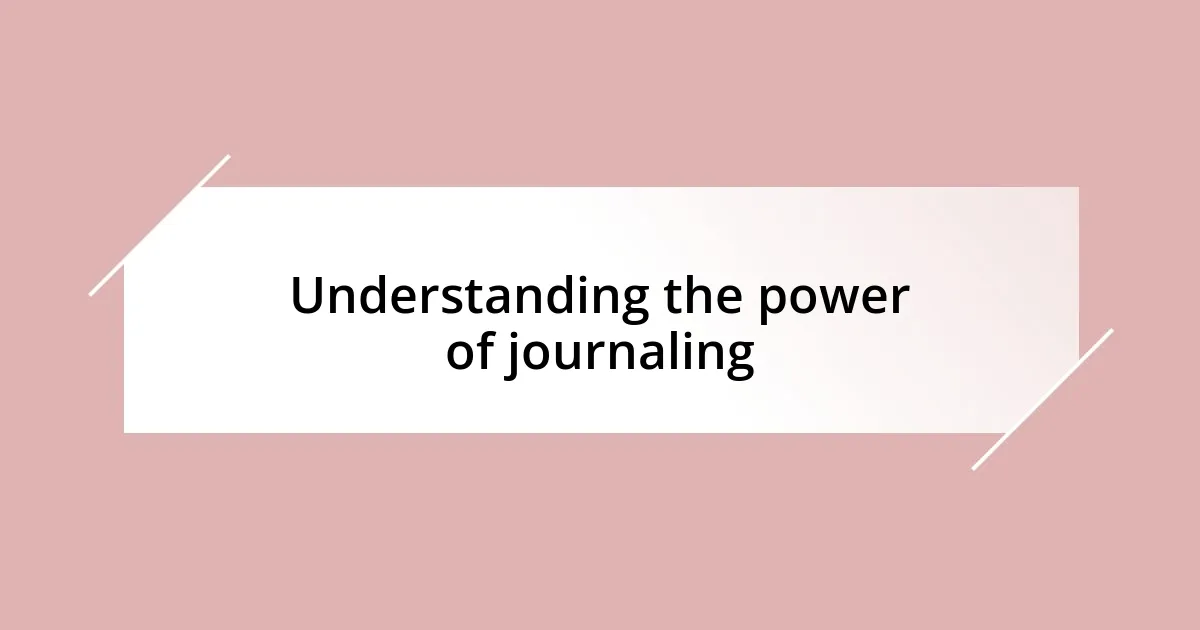
Understanding the power of journaling
Journaling, for me, began as a simple exercise but quickly transformed into an emotional sanctuary. I remember nights when I felt overwhelmed, pouring my heart onto the pages. Those words became my voice when I struggled to speak them aloud. Have you ever felt that weight lifting as soon as you put pen to paper?
As I scribbled away my thoughts and feelings, I discovered patterns in my emotions that I never recognized before. It’s fascinating how revisiting those pages reveals the threads connecting my experiences. I often found clarity in my confusion, almost like my journal was a trusted friend, guiding me through the fog.
What surprised me the most was the cathartic release that journaling provided. There were days when I felt like I was drowning in my thoughts, but writing them down felt like throwing a lifeline to myself. Have you ever experienced that moment when the act of journaling shifted your perspective entirely? In my journey, each entry became a stepping stone toward healing, illuminating paths I never knew existed.
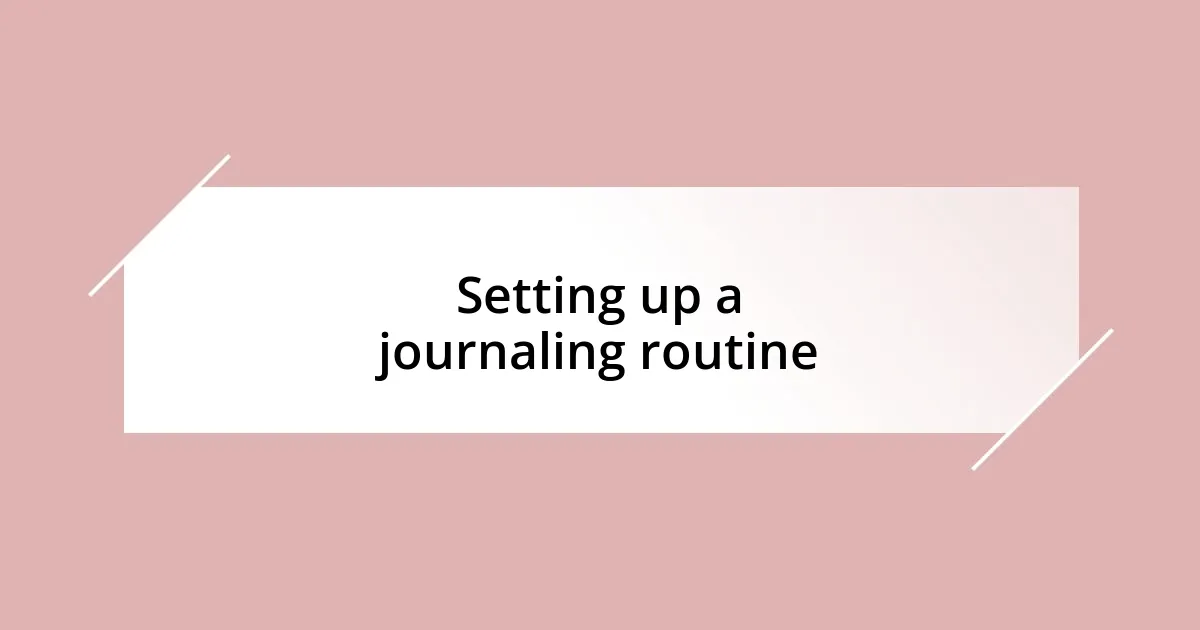
Setting up a journaling routine
Establishing a consistent journaling routine was crucial for me. I started by setting a specific time each day—usually early mornings when my mind was fresh. I found that this regularity helped me create a sacred space where I could delve into my thoughts. Just like brushing my teeth, journaling became a non-negotiable part of my day, integral to my mental well-being.
- Choose a dedicated time: Early morning or before bed works best for many.
- Find your space: Comfy corners or quiet rooms enhance focus.
- Decide on duration: Start with just 5-10 minutes; you can build from there.
- Use prompts: On days when ideas escape me, prompts ignite my creativity.
- Stay consistent: Aim for daily entries, but don’t be hard on yourself if you miss a day.
Creating this structure allowed me to embrace journaling fully. On days when I struggled, that time and space became my refuge. Journaling was no longer just writing; it morphed into a reliable ritual that I genuinely looked forward to.
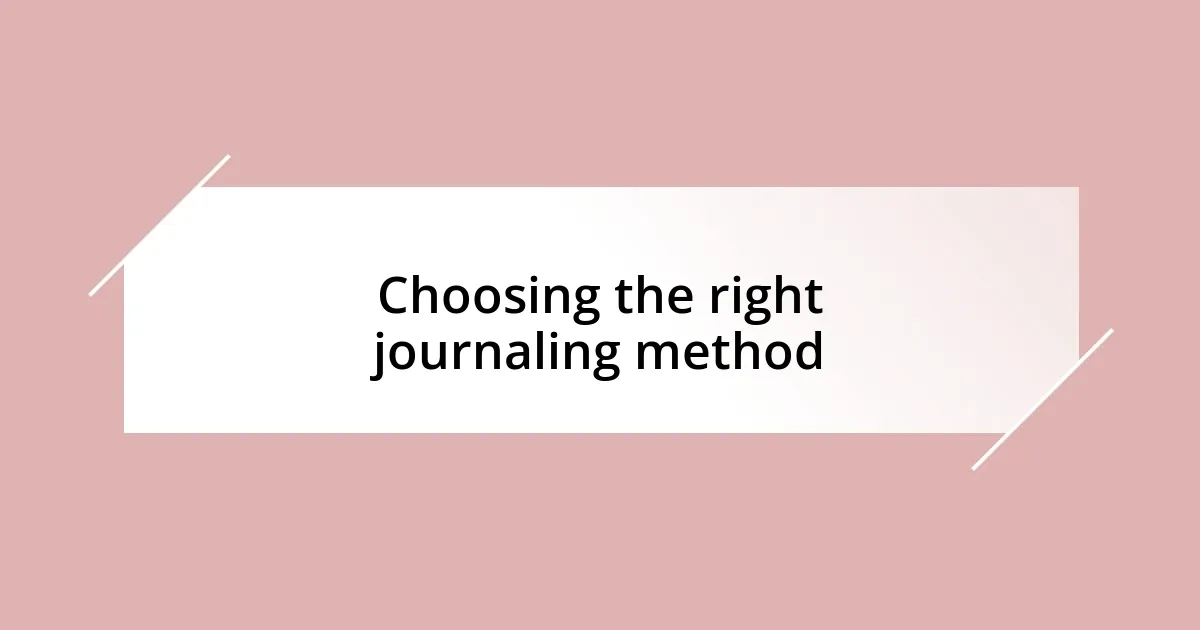
Choosing the right journaling method
Choosing the right journaling method is essential since it can significantly impact your healing journey. I experimented with various styles before discovering what resonated most with me. For instance, I started with free writing, which allowed my thoughts to flow without judgment. I remember scribbling pages filled with raw emotions, and that free expression felt liberating. However, I soon found that structured methods, like gratitude journaling, added a refreshing perspective, helping me focus on the positive aspects of my life even during challenging times.
When I tried bullet journaling, I experienced a blend of creativity and organization. I loved crafting colorful layouts and tracking my moods alongside daily tasks. This approach not only nurtured my artistic side but also provided clarity and purpose to my journaling practice. It’s incredible how a method can shift your entire experience, isn’t it? I encourage you to reflect on what elements make you feel engaged and supported as you choose your method.
Below is a comparison of popular journaling methods that can help you decide what’s best for you:
| Method | Description |
|---|---|
| Free Writing | Unstructured writing without rules; perfect for emotional release. |
| Gratitude Journaling | Focusing on positive aspects of life, helps shift perspective. |
| Bullet Journaling | Combination of organization and creativity; tracks moods and tasks. |
| Prompt Journaling | Using specific questions or topics to inspire deeper reflection. |
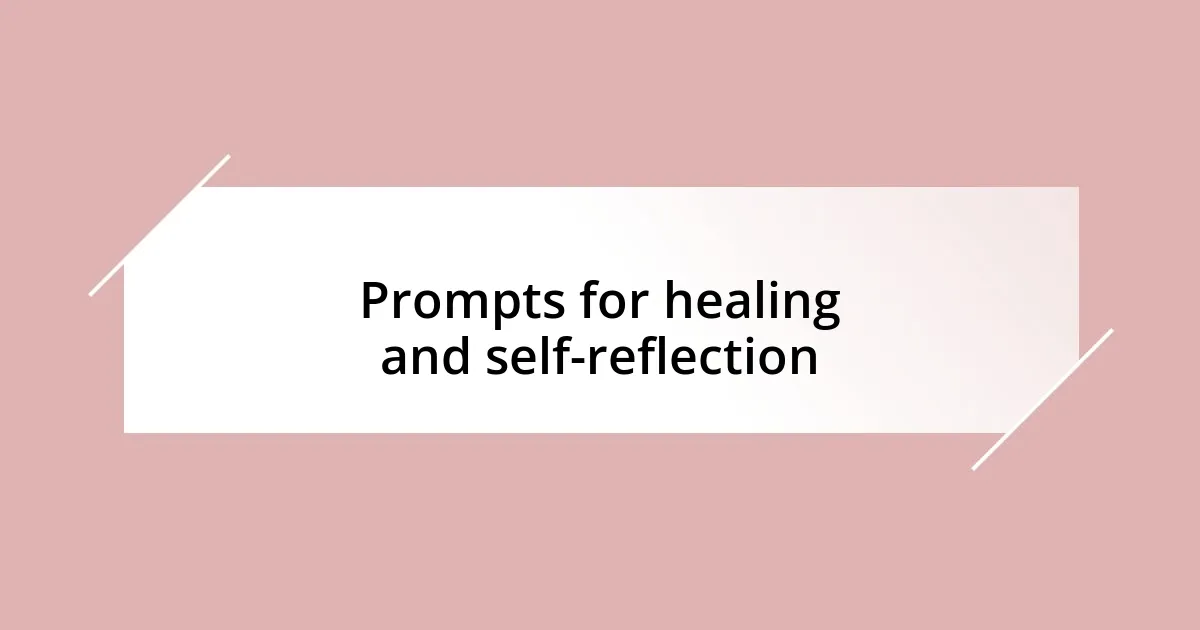
Prompts for healing and self-reflection
When I first started journaling, I found that specific prompts could act like a gentle nudge, guiding my thoughts into deeper realms of self-reflection. One prompt that resonated with me was, “What am I afraid to let go of?” I remember staring at the page, my heart racing as I wrote about past experiences that weighed heavy on my soul. It felt both vulnerable and empowering to confront those fears head-on; it reminded me that acknowledging what hurts is the first step toward healing.
Another powerful prompt I often turned to was, “What does joy look like in my life right now?” This question took me on a delightful journey of rediscovery. I vividly recall one evening, sitting in my garden, pen in hand, as I captured the simple pleasures—a warm breeze, my cat purring beside me, and the vibrant colors of blooming flowers. Reflecting on these moments not only lifted my spirits but cultivated a sense of gratitude, turning my focus from what was wrong to what was beautifully right in my life.
Sometimes, I also explored the prompt, “If I could tell my younger self one thing, what would it be?” It struck a chord every time. I would find myself pouring out words of encouragement, love, and wisdom; it was as if I was simultaneously healing two versions of myself. I genuinely believe that asking ourselves these questions encourages a dialogue with our emotions, ultimately leading us toward healing and self-discovery. Have you tried finding prompts that resonate personally with you? It can be a transformative experience, as I discovered firsthand.
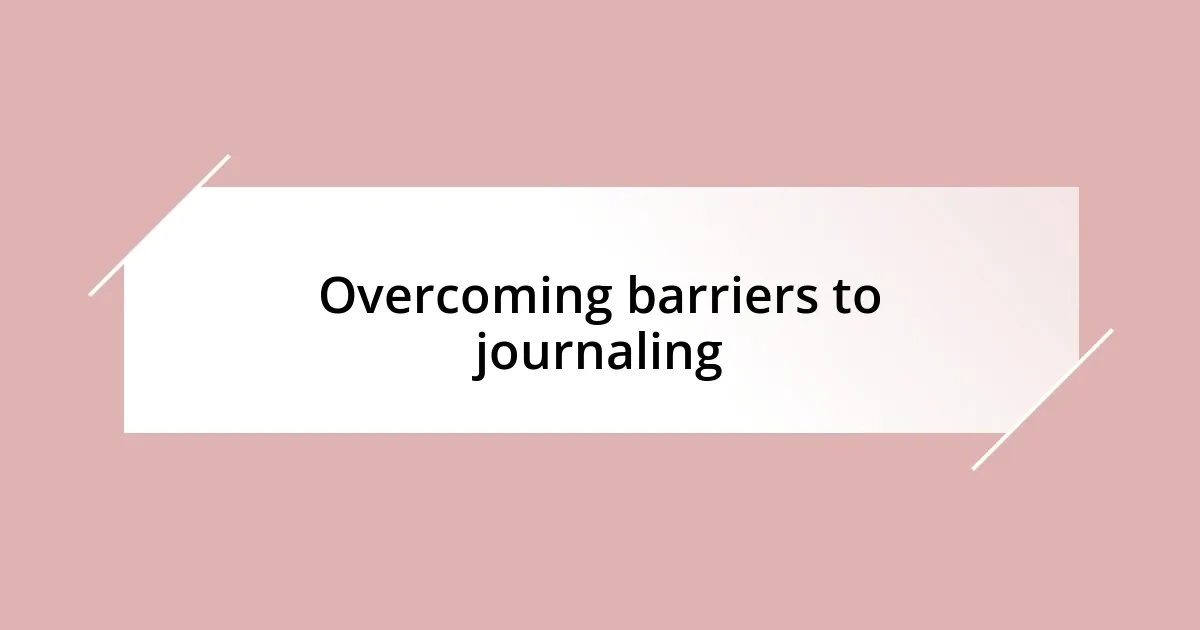
Overcoming barriers to journaling
Barriers to journaling can often feel insurmountable, especially when self-doubt creeps in. I remember staring at a blank page, wondering if my words would ever measure up. It took some time to realize that my journal was a safe space, free from judgment. What if I told you that the worry about “writing something profound” isn’t a barrier but a common struggle that everyone faces? Acknowledging that imperfection is part of the journey was liberating for me.
Another challenge is finding the time to write. In my busy life, I often thought, “I just don’t have moments to spare.” Yet, I discovered that even five minutes a day could be impactful. I would jot down thoughts while sipping my morning coffee or during a brief lunch break. Those snippets of time added up. How often do we underestimate the power of small moments? Embracing journaling doesn’t require long sessions; it’s about consistent, meaningful engagement with oneself.
Sometimes, fear of vulnerability stops people from journaling. I used to hesitate to write about my deepest emotions, fearing they were too overwhelming or that they’d expose my insecurities. But as I leaned into that discomfort, I found that writing could be an act of bravery. Each word transformed heavy emotions into lighter reflections. Have you ever noticed how confronting your feelings on paper can liberate you? For me, journaling became a conversation with my fears, leading to newfound strength and clarity.
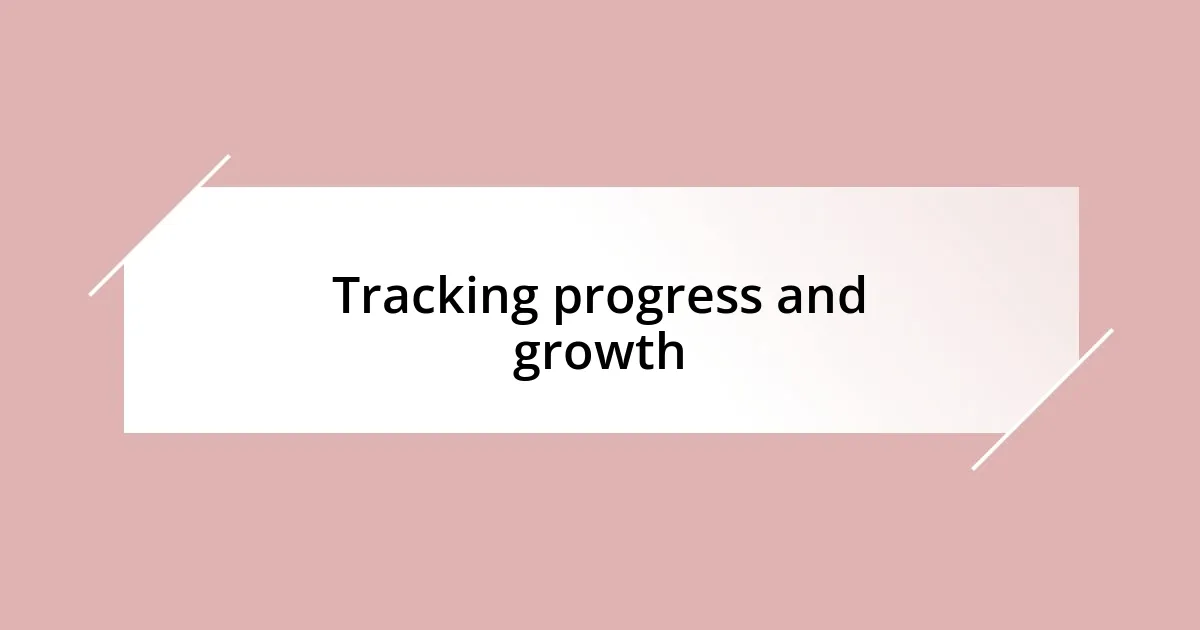
Tracking progress and growth
Tracking progress and growth through journaling has been an eye-opening journey for me. I often flip back through my pages to revisit thoughts and feelings I had months ago. It never ceases to amaze me how much I’ve evolved—the hesitant words of a few months ago now seem foreign to me. Have you ever experienced a moment of realization about how far you’ve come?
The act of documenting my growth has been incredibly rewarding. Sometimes, it feels like weaving together a tapestry of my experiences. I recall reviewing a passage where I described a particularly tough day, and it hit me how I had shared a moment of clarity right after—something I had completely forgotten about. That juxtaposition made me see that in every struggle, there exists a seed of triumph waiting to bloom. It’s as if my journal serves as a mirror, reflecting not just who I was but also who I am becoming.
Each entry is a marker in my journey, showcasing not just the challenges I faced but also the solutions I discovered. There are times when I jot down my emotional states and track patterns—maybe a recurring feeling of anxiety during certain situations. Seeing these trends has been essential in helping me address my triggers. Have you ever thought about how much insight your personal reflections can provide? By observing my emotional landscape, I’ve learned to nurture growth in areas that needed attention, leading me to a more balanced path.
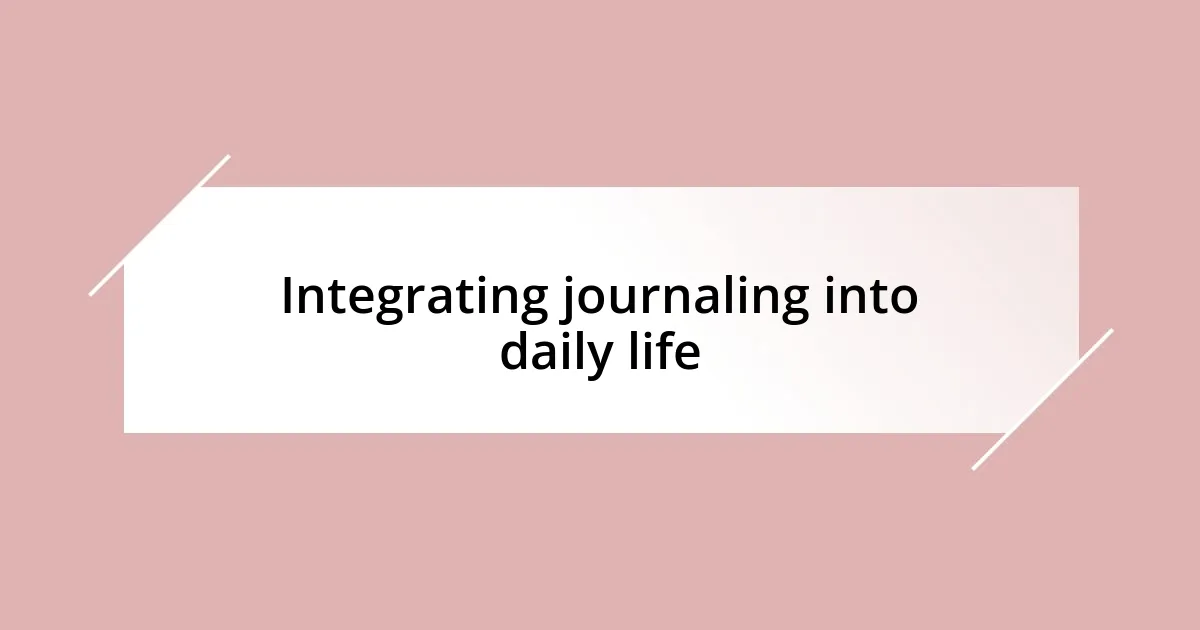
Integrating journaling into daily life
Integrating journaling into daily life can feel daunting at first, but I found that weaving it into my routine made all the difference. Previously, I thought I needed a quiet, uninterrupted space to write. However, I discovered that capturing my thoughts during my morning commute or right before bed was just as meaningful. Have you ever noticed how a fleeting thought can change your perspective? I often experienced revelations while writing in those seemingly chaotic moments.
Finding a consistent time became a ritual that I looked forward to. I remember the first time I committed to journaling each Sunday afternoon. It turned into a sacred hour where I reflected on the week—a blend of gratitude and lessons learned. That structured time turned what felt like a chore into a moment of self-care. Isn’t it interesting how a routine can transform your view of an activity? For me, journaling morphed from a task to a treasured practice.
Moreover, embracing spontaneity has truly enriched my journaling experience. I often keep my journal within arm’s reach, ready to capture fleeting thoughts or feelings as they arise. It was during a particularly overwhelming day when I scribbled down my frustrations in a public park, feeling lighter with each stroke of my pen. How often do you allow yourself to be spontaneous with your reflections? The unpredictability of those spontaneous entries added a layer of authenticity that I hadn’t expected, reminding me that my emotions are valid at any moment.



